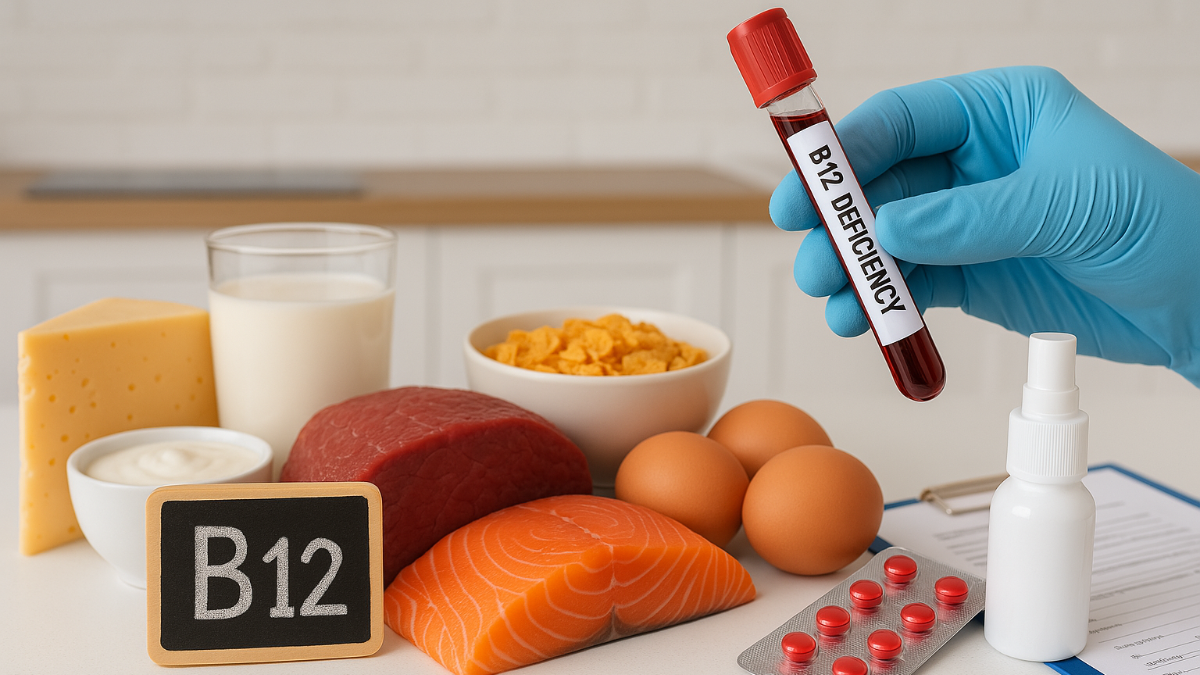Vitamin B12 Deficiency: Causes and What It Means
Updated: March 31, 2025

Vitamin B12 is a big deal for millions of people around the world. Doctors are spotting it more often these days, showing it's a growing worry. This nutrient keeps your blood, nerves, and energy going strong, so figuring out why it drops helps folks feel better and keeps healthcare providers on their toes. Here's what causes it and how it's stirring things up.
Lack of Intrinsic Factor
Your stomach makes a helper protein called intrinsic factor that grabs B12 from food and gets it into your blood. Without enough of this protein, B12 can't get through, often leading to pernicious anemia. That's a tough condition that can mess with your nerves, leaving you tired, weak, or with tingling in your hands and feet if it's not diagnosed. It happens when your immune system turns on your stomach lining, hurting the cells that pump out intrinsic factor. Doctors might test your blood for this, sometimes checking a marker called methylmalonic acid to be sure. Labs see more people asking for these tests, keeping suppliers busy with antibody kits and B12 shots.
Vegan Diet
Plant-based eating is picking up steam, but it's got a catch. B12 only shows up naturally in animal foods like meat, fish, eggs, and milk; think beef, salmon, or cheese. If you're vegan or a strict vegetarian, you've got to find other ways to get it, especially if you're pregnant or raising kids on the same diet, since babies need it to grow right. Fortified foods like plant milks or cereals and supplements fill the gap. Sales of these are climbing fast as more folks skip animal products, giving small suppliers a solid shot at meeting that need with pills or enriched goodies.
Bowel Problems
Gut troubles can stop B12 from getting where it needs to go. People with Crohn's disease or who've had bowel surgery often run into this. Short bowel syndrome brings diarrhea, cramps, and heartburn, and with a shorter small intestine, vitamins like B12 slip through the cracks. You might feel worn out or dizzy from it. New ways to get B12, like shots or liquids that skip the gut, are helping, and doctors say they're working well. That's a handy opening for suppliers offering these fixes to folks with long-term tummy issues.
Lacking Stomach Acid
As you age, your stomach might not make as much acid, which you need to pull B12 out of food. About 10-30% of people over 50 deal with atrophic gastritis, where the stomach lining thins out, making it harder to grab this nutrient. Taking acid-lowering meds like proton pump inhibitors, H2 blockers, or antacids adds to the trouble. You could feel sluggish or off-balance if it drags on. These folks turn to sublingual drops or sprays that don't need stomach acid, and those are selling quickly, a steady win for suppliers helping older adults or anyone on these meds.
Chronic Alcohol Use
Drinking too much for a long time throws off your gut and how it takes in nutrients. Studies show it can really cut your B12, sneaking up with tiredness or nerve twitches before you know it. Places helping folks with drinking troubles are mixing in nutrition fixes and pairing up with companies that make supplements and tests. It's a quiet but real need suppliers can step into.
Medications
Some everyday meds can mess with B12. Metformin, used for diabetes, and acid-cutting drugs like proton pump inhibitors show a link; the longer you take them, the trickier it gets. Stop the meds, and it often clears up. You might feel worn down or foggy if it's low. Drug companies are tweaking new versions to ease this as doctors catch on more. It's a nudge for suppliers to keep B12 options ready for these patients.
Bacterial Infection
Helicobacter pylori, the bug behind stomach ulcers, can hurt the cells, making intrinsic factors and dropping your B12. It starts with stomach aches or bloating but can quietly lower nutrient levels. Testing kits for this bacteria are in hot demand, especially where it's common, keeping suppliers on their toes with B12 boosts and ulcer care.
Exposure to Nitrous Oxide
Nitrous oxide, or laughing gas, is a dentist's go-to for pain, but it can zap B12 in your body. That's risky if your levels are already low, showing up as numbness or weakness. Healthcare workers around it face the same pinch. Gear to catch this gas or switch sedation is picking up, and suppliers see a chance with safer tools and B12 checks.
Looking Beyond
From new ways to take it to better tests, this vitamin gap is pushing creative fixes. The causes stay the same, but how we handle them keeps changing. What's wild is how B12 ties together diet picks, aging, meds, and even job risks into one challenge that hits all kinds of people. Solving it brings answers that help everyone, whether a quick pill or a sharper test to catch it early.
Conclusion
Running low on B12 gives people clear ways to bounce back, like popping a pill or tweaking what they eat. For small B2B suppliers, it's a real shot to offer things folks need: think supplements, test kits, or fortified goodies.